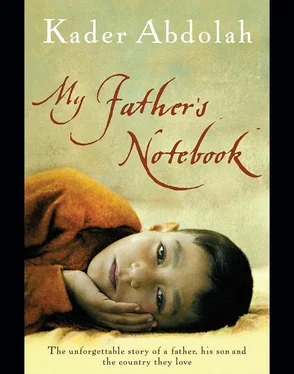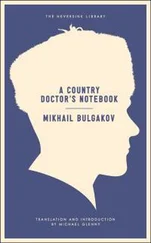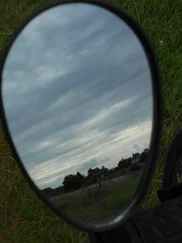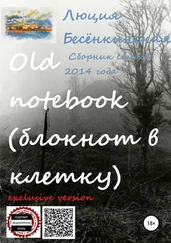It was a political deed of the first order and at the same time a fairy tale that was taking shape before our eyes. Anyone who has read Sheherazade’s tales of the thousand and one nights will understand what I mean.
Reza Shah had once come here to plug up the well. Now Khomeini was standing on the same spot. A kingdom had vanished and been replaced by the regime of the mullahs.
• • •
Khomeini got to his feet. He reached into his pocket, apparently in search of something. Ah, his glasses, but this wasn’t the right pair. He checked his other pocket, but didn’t find them. He must have left them somewhere.
Khomeini put on the pair he did have and checked to see whether they would do. No, he couldn’t see a thing. So he took them off and tucked them back in his pocket. Then he stepped up to the well, leaned over and stared down into its depths.
Apparently, he still couldn’t see anything, because he quickly straightened up again. Then, once more, he leaned over and stared into the well. Clearly, he was looking for the Mahdi, but couldn’t see him. Or could he?
He nodded three times by way of greeting, then began to speak into the sacred well. A hush fell over the crowd. Everyone knew that Khomeini was seeking the Mahdi’s advice, that he was asking him how to govern the country.
How long did the conversation last? I don’t know.
What did he say to the Mahdi? I don’t know. However, he no doubt began with the following words: “As-salaamo aleika ya Mahdi ibn Hassan ibn Hadi ibn Taqi ibn Reza ibn Kazem ibn Jafar ibn Baqir ibn Zayn ibn Hussein ibn Ali ibn Abi Taleb.”
After a while he gestured for help. The seven bearded mountain climbers rushed over, lifted him up on their shoulders and carried him back to the helicopter. The crowd shouted, “Khoda ya! Khoda ya! Khomeini-ra negah dar!”
It was the dawning of a new era in Iranian history.
Time goes so fast! When I was little and went everywhere with my father, time seemed to stand still. The days crawled by, the nights were endless. Now I can see that it all went by in a flash.
• • •
I sit here in the polder and look out of the window. I feel frozen in time, stuck at my computer forever. Luckily I know from experience that this, too, will pass.
In the meantime, Khomeini has disappeared, died, as if he never existed. One night he took off his aba, fell asleep and didn’t wake up again.
The era of the sacred well is also over. The Mahdi has vanished. The well is empty. Wild pigeons build their nests on the ledges. Poisonous snakes coil up behind the rocks, wait patiently for the birds to leave, then slither into the well and eat the eggs. The pigeons come back, see their empty nests and weep.
This, too, will come to an end.
Autumn turns to winter and it snows on Saffron Mountain. For several months, the well is covered with a thick layer of snow. Then spring comes, the snow melts and the well fills with water. It’s an anxious time for the mountain goats. They watch their young and push them away from the well, afraid they’ll fall in.
The Soviet Union has also ceased to exist. If you were to stand at the top of Saffron Mountain and stare through your binoculars, you’d no longer see red flags and a checkpoint on the other side of the border, or gendarmes on this side. It’s all gone. Everyone’s gone. Including me.
I’m here, but where’s the Mahdi? Perhaps he’s also moved to the Dutch polder.
Sometimes I see in the distance the figure of a man, walking his dog on the dyke. I walk towards him, but no matter how fast I walk or run, I never catch up with him. So I let him go, along with his dog. We both need this polder.
It’s peaceful here in the polder, unlike the rest of the world. The moment you turn on your TV, however, you realise that the quiet is deceptive.
Saddam Hussein occasionally flashes on the screen. Then the President of the United States says a few nasty things about him. By now everyone knows that under Khomeini’s leadership we fought for eight years with neighbouring Iraq. Thousands died and thousands were wounded, on both sides. What was the war about? Nothing. Just the stupidity and stubbornness of two crazy leaders. Next, Saddam moved on to attack his other neighbour, Kuwait. America chased him out of there and he crawled back into his hole. But he keeps crawling out again.
I don’t want to talk about Saddam. I just want to use him as a stepping stone to my father’s notebook.
When Khomeini became the absolute ruler of Iran, the party wasn’t sure how to react. We didn’t trust him and were convinced he wouldn’t tolerate a leftist movement any more than the shah had. We knew he’d outlaw the party at the first possible opportunity. Even so, we were anxious to make use of our temporary freedom. We therefore opted for a semi-legal existence. The party opened an office in Tehran, where a few leaders operated in the public eye. At the same time, however, the movement’s most important activities were kept underground.
One of those closely guarded secrets was the location of the printing press and the place where the party’s editorial board met. In those days, I was one of the editors.
I no longer remember the date, but my oldest sister was going to get married that day and I had agreed to drive home for the wedding. At about one o’clock, warplanes suddenly flew over Tehran, so low and so loud that everyone clapped their hands to their ears and ducked for cover.
Saddam bombed Tehran’s airport. The war had begun. Instead of going to the wedding, I hurried back to the newspaper.
• • •
Iraqi planes bombed our houses one night, and we bombed theirs the next.
One evening, during the second or third year of the war, the phone rang. It was Golden Bell.
“Ishmael? Listen, Tina’s not well.”
“What’s wrong?”
“She’s been hit by a bomb.”
“A bomb?”
“Well, she didn’t exactly get hit, but …”
“When did it happen?”
“Last week, when the Iraqi planes started flying over Senejan. I think you’d better come up here.”
How stupid of me. I should have phoned. I knew that Senejan had been bombed. I’d put the news in the paper myself. There had been a couple of deaths, but the planes had bombed an industrial area far from our house. How could Tina have been hit?
I reached Senejan in the middle of the night. The city was in darkness. Not a single light was on. A man racing away on a bicycle yelled, “Saddam’s going to bomb the city tonight. He announced it on the radio this afternoon.”
Everyone had fled into the mountains. How would I be able to find my family? I switched off my headlights and drove cautiously down the darkened streets to our house. I was hoping they’d left me a note. Just as I was about to park the car, a figure came out from under the trees.
My father. We couldn’t communicate in the dark. He got in the car and gestured: “Drive! Get out of here!”
“Where’s Tina?”
“I carried her up to the mountains on my back,” I gathered from his gestures.
I drove off. Once we were in the mountains, I hid the car behind a boulder and turned on the inside light. “What’s happened to Tina?” I signed.
“She was at the home of your sister Marzi, who, by the way, is pregnant,” he signed back. “They were standing in the courtyard. Suddenly an airplane flew over the house and dropped a bomb.”
“On her house?”
“No, on a nearby tractor factory. But one of the walls in Marzi’s house collapsed. Tina thought the bomb was going to fall on the house. She pulled Marzi to the ground and lay on top of her to protect her. After the airplane left, Marzi got up. But Tina didn’t.”
“Was she wounded?”
“No. I mean, yes, her left arm was bleeding. But she didn’t open her eyes. They took her to the hospital. I went with them, I saw her lying in bed. Her eyes were open, but she didn’t know who I was. They had her strapped to the bed.”
Читать дальше












